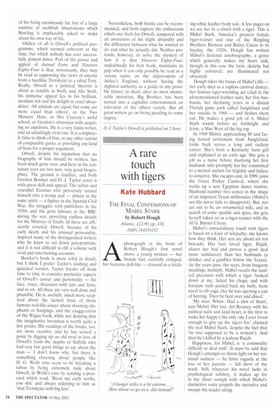A rare touch with tigers
Kate Hubbard
THE FINAL CONFESSIONS OF MABEL STARK by Robert Hough Atlantic, £12.99, pp. 430, ISBN 184354152 Aphotograph at the front of Robert Hough's first novel shows a young woman — her blonde hair carefully crimped, her features doll-like — dressed in a fetch
ing white leather body suit. A few pages on we see her in a clinch with a tiger. This is Mabel Stark, America's greatest female tiger-trainer and star of the Ringling Brothers Barnum and Bailey Circus in its heyday, the 1920s. Hough has written Mabel's fictional autobiography, a genre which generally makes my heart sink, though in this case the facts, sketchy but highly coloured, are illuminated not obscured.
Hough takes the bones of Mabel's life — her early days as a topless carnival dancer, her famous tiger-wrestling act (clad in the aforementioned leather suit), her five husbands, her declining years in a dismal Florida game park called Jungleland and her suicide in 1968 — and fleshes them out. He makes a good job of it. Mabel Stark stands before us. forthright and feisty, a Mae West of the big top.
In 1968 Mabel, approaching 80 and facing forced retirement from Jungleland, looks back across a long and rackety career. She's born a Kentucky farm girl and orphaned at an early age. She gets a job as a nurse before marrying her first husband, who promptly has her committed to a mental asylum for frigidity and failure to conceive. She escapes and, in 1909, joins the Great Parker Carnival, where she works up a sexy Egyptian dance routine. Husband number two comes in the shape of an impotent Texan millionaire (Mabel's sex life never fails to disappoint). But, not cut out to be an ornamental wife, and in search of some sparkle and spice, she gets herself taken on as a tiger-trainer with the Al G. Barnes Circus.
Mabel's extraordinary touch with tigers is based on a kind of telepathy; she knows how they think. Her acts are about art not bravado. Her best loved tiger, Rajah, shares her bed and proves a good deal more satisfactory than her husbands (a drinker and a gambler follow the Texan). As the years pass, the scars, from frequent maulings. multiply. Mabel recalls the studied precision with which a tiger 'looked down at me, licked his chops, and with forepaw nails peeled back my belly, from navel to rib cage, like he was opening a can of herring. Then he bent over and dined.'
'My men. Whew. Had a slew of them', says Mabel. Her last, Art Rooney, with his painted nails and kind heart, is the first to make her happy ('the only one I ever loved enough to give up the tigers for,' claimed the real Mabel Stark, despite the fact that 'he was supposed to be a woman'). And then he's killed by a jealous Rajah.
Happiness, for Mabel, is 'a commodity difficult to deal with'. It must be said that Hough's attempts to throw light on her terminal sadness — he hints vaguely at the loss of her parents — fall short of the mark. Still, whatever his novel lacks in psychological subtlety, it makes up for in the sheer oomph with which Mabel's distinctive voice propels the narrative and sweeps the reader along.


































































 Previous page
Previous page